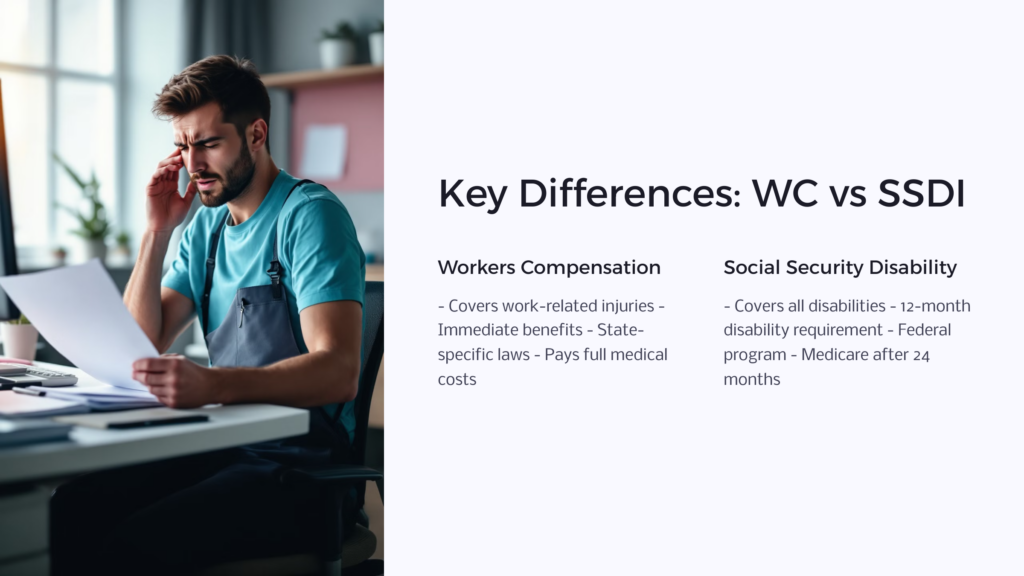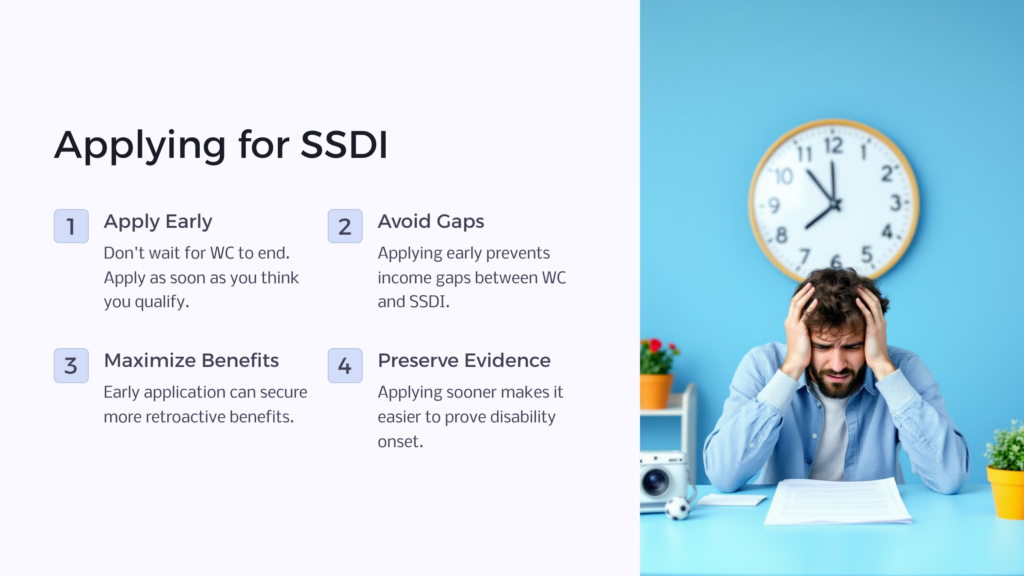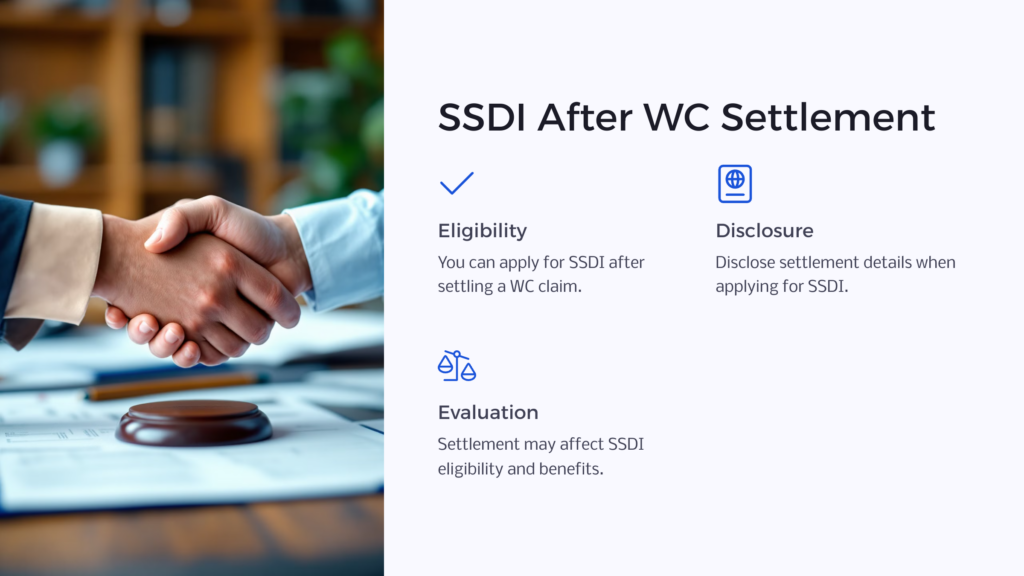Workers Compensation (WC) and Social Security Disability (SSDI)
If you’ve had an on-the-job injury and are eligible for workers compensation, you may be eligible to receive both workers compensation and Social Security Disability at the same time. However, your Social Security Disability may be reduced or suspended for months in which you are eligible for both benefits and the two benefits together exceed a certain amount. The reduction is called a workers compensation offset. The offset is discussed in detail later in this article.
Differences Between WC and SSDI

Workers compensation laws vary somewhat from state to state; however, a couple differences in eligibility criteria for WC and SSDI are universal. First, Social Security and workers compensation have different definitions of disability. Social Security requires you to be disabled not just from the job you were in when you were injured but also from other kinds of work that you could perform if you did not have physical or mental limitations. In contrast, workers compensation requires only that you be disabled from the occupation you were in at the time you incurred the injury or work-related illness.
The second universal difference is the length of time you have to be disabled to receive benefits. Workers compensation benefits can be paid immediately; whereas to be eligible for Social Security Disability, you have to have been or expect to be disabled for twelve months. Another difference is that workers compensation will pay the full cost of medical treatment for your work-related injury beginning with when it occurs; it will not pay to treat other medical conditions. Social Security, on the other hand, does not provide health insurance (Medicare) until you have received twenty-four months of SSDI benefits. Once you have Medicare, it will pay a portion of your medical treatment for any medical condition, not just your disabling condition.
Don’t Wait to Apply for SSDI

Even if you are receiving sufficient income from your WC claim, don’t wait to file your SSDI claim. If you think that you may meet Social Security’s disability definition and that you will be disabled for twelve months, you should apply right away. Numerous reasons exist for why it is a good idea to file an application for Social Security Disability as soon as you think you might qualify.
First, if you wait till your workers compensation runs out or is close to ending, you may be left with no income while your Social Security claim is pending. Second, because of time limitations on retroactive SSDI benefits, you may even lose back Social Security benefits if you apply more than seventeen months after you become disabled. Finally, the farther you move away from the onset (beginning) of your disability, the harder it may be to prove that you became disabled from all occupations at that time. This is especially important if you have been working intermittently. If you have, your Social Security Disability insured status might expire while you are getting workers compensation requiring you to prove that you became disabled prior to the expiration to get any Social Security Disability benefits at all.
Can I Get Disability After a Workers’ Comp Settlement?

Yes, you can apply for disability benefits after settling a workers’ compensation claim. The eligibility for disability benefits will depend on various factors, including the extent of your disability, the terms of the settlement, and the specific disability benefits program you are applying for. It is crucial to understand the requirements and guidelines of the disability benefits program to determine your eligibility.
How does a workers’ comp settlement affect my disability claim?
A workers’ compensation settlement may be considered when assessing your eligibility for disability benefits. It can sffect the terms of the settlement, including the amount received and the nature of the settlement agreement. It’s essential to disclose any workers’ comp settlement information when applying for disability benefits to ensure transparency and accurate evaluation of your claim.
What disability benefits programs can I apply for after a workers’ comp settlement?
After settling a workers’ compensation claim, you may be eligible to apply for disability benefits programs such as Social Security Disability Insurance (SSDI) or Supplemental Security Income (SSI). These programs have their own eligibility criteria, including specific medical and work requirements. It is advisable to review the guidelines and consult with the relevant disability benefits program to determine if you meet the necessary qualifications for disability benefits.
The Workers Compensation Offset
The amount of Social Security Disability (SSDI) benefits you receive and/or the Social Security dependent benefits your family receives will be reduced in any month that WC and Social Security Disability overlap if your and your family’s Social Security together with your workers compensation exceed 80% of your Average Current Earnings (ACE) as determined by the Social Security Administration (SSA). (A discussion of the ACE calculation factors follows.) If there is an offset, the offset will be against your dependents benefits first. If additional offset is required, your benefit will be reduced also. (In a few states, the offset causes reduction of the workers compensation instead of the Social Security.)
For example, if your average current earnings (ACE) are $2,000.00, eighty percent of your average earnings would be $1,600.00. If you are getting $1,300.00 from workers’ compensation, the most you and your dependents could get from Social Security would be $300.00 a month. In this example, your benefits would be reduced to $300 during the offset period and your dependents would receive no benefits during that period.
It is important to note that workers compensation settlements or lump sum permanent partial disability (PPD) and permanent total disability (PTD) payouts are prorated (broken down) into a monthly amount and spread over a period of time during which the monthly amount is used in figuring any necessary offset. This means that the offset for a lump sum payment will continue in months after the month in which you receive the lump sum payment. The formula for the proration depends on how the settlement or lump-sum payout is written. Because you may receive little or no Social Security until the lump sum proration runs out, in most cases it is advisable not to spend the lump sum quickly by paying off large sums of debt or making large purchases. The reason is that the lump sum will be needed to cover your regular monthly living expenses for as long as the proration and workers compensation offset continue.
Calculating ACE
The calculation of Average Current Earnings (ACE) is multi-stepped and complex. Social Security performs three different preliminary calculations and the ACE used for the workers compensation offset is the figure that is most favorable with the highest earnings of the three calculations. One calculation is the highest year of earnings from the year of disability and the five years before that year that divided by twelve; the second calculation is the five consecutive years of highest earnings after 1950 divided by sixty; and the third calculation is the total earnings of the years used to calculate your benefit before workers compensation offset divided by the number of months in that period. When an offset applies, you can ask Social Security to explain how your ACE was calculated.
When Workers’ Compensation Offset Stops
Once your workers compensation benefits—whether temporary monthly benefits or a prorated lump sum—no longer overlap with Social Security, your Social Security Disability benefits and your family’s Social Security dependents benefits will increase to the full amount.
Workers’ compensation offset will also stop if you are still receiving worker’s compensation or a lump sum is still being prorated when you reach your Social Security Normal Retirement Age. At that time, you will no longer get Social Security Disability because you will be switched to Social Security Retirement and workers’ compensation offset will no longer apply.
Why Apply When There Is an Offset?

Even if your total benefits between workers comp and Social Security Disability (SSDI) are no more than the workers compensation alone during the offset period, there are benefits to applying for Social Security Disability while on workers comp. First, you have no way of knowing for sure how long workers comp benefits will continue or whether or how much you might receive in a closing settlement. In contrast, if you qualify for SSDI and remain disabled, your benefits will continue to your normal retirement and then be automatically switched to Social Security Retirement benefits. Also, Medicare starts after twenty-four months of SSDI entitlement even if benefits are suspended for the workers compensation offset. Lastly, if you are able to return to work, any year that you are on Social Security’s books as disabled will not count against you as a year of zero or low earnings when your Social Security Retirement benefits are calculated at retirement time.
 Benefits.com Advisors
Benefits.com Advisors
With expertise spanning local, state, and federal benefit programs, our team is dedicated to guiding individuals towards the perfect program tailored to their unique circumstances.
Rise to the top with Peak Benefits!
Join our Peak Benefits Newsletter for the latest news, resources, and offers on all things government benefits.



















